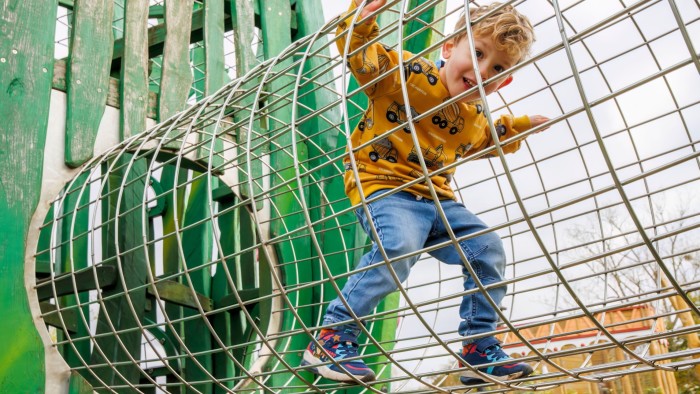Stay informed with free updates
Simply sign up to the Social affairs myFT Digest — delivered directly to your inbox.
UK ministers are under mounting pressure to stem the long-term decline in children’s playtime, which MPs and experts warn is leading to the loss of vital social skills, learning and health across the country.
MPs have called on the government to introduce a “national play strategy” in England to boost the amount of time that children spend playing outdoors, which has fallen steadily in recent decades.
“Children’s worlds have shrunk enormously over the last 50 years,” said former children’s commissioner Baroness Anne Longfield. “They now spend vast amounts of time indoors, often on their screens, when in the past they would have been outdoors playing with others.
“It has a dramatic impact on their independence, their social skills and their confidence in navigating the world,” she added. “We need to reclaim childhood.”
The right to play is enshrined in law in Scotland and Wales, meaning that schools are legally mandated to integrate recreation into breaktimes and ensure outside spaces include areas for the purpose of play.
However, no such requirement exists in England after the last scheme was abandoned by the Conservative-led coalition in 2010.
Tom Hayes, Labour MP for Bournemouth East, is behind the formation of a cross-party parliamentary group for play that will be launched in the House of Commons in May.
“Unlike Scotland and Wales, we don’t have a national framework to ensure local action, funding and policy,” Hayes said. “A national play strategy is an investment in the very goals of the government, ensuring that children are seen, heard and supported.”
A national play strategy was implemented by the last Labour government in 2008, when then ministers Ed Balls and Andy Burnham pledged £235mn to improve children’s access to recreation.
The policy provided funding for 3,500 new or refurbished play areas and 30 large adventure playgrounds but was abandoned after two years as part of the coalition government’s austerity agenda. Since children’s access to play has steadily deteriorated, say experts.
Nearly a third of children under nine live more than a 10-minute walk from their nearest playground, according to the 2024 Green Space Index.
While children play most adventurously in play centres, parks and green spaces, surveys show British preschoolers now spend the majority of their playtime indoors. Girls and children from minority ethnic backgrounds are disproportionately less likely to play outside.
There is evidence of changing parental attitudes across the generations, with parents becoming more risk averse.
More than 80 per cent of 55- to 64-year-olds said they regularly played out on the street and had freedom to explore when they were young, compared with only a quarter of children today, according to a 2022 survey.
The UN Convention on the Rights of the Child, to which the UK is a signatory, recognises play as a fundamental right. But Eugene Minogue, executive director of campaign organisation Play England, warned of a “steady erosion” in both provision since the last national strategy was dropped.
“We’re now seeing the consequences — rising anxiety, falling wellbeing, and fragmented communities,” he said.
An independent inquiry into the state of play in England was launched last June by Longfield, executive chair of the Centre for Young Lives, and Paul Lindley, entrepreneur and children’s campaigner. Its interim recommendations in February called for the government to establish a new national strategy.
The Raising the Nation Play Commission, which led the inquiry, also recommended that the Department for Education ringfenced time for play in the school day and that education regulator Ofsted include playtime in its assessment criteria.
Across all age groups, schools have cut the length of playtime. The average daily breaktime in English schools fell by almost a quarter for children aged five to seven between 1995 and 2021, according to the commission.
The Department for Education said it was taking action to help thousands of schools improve their outdoor spaces. “We are committed to ensuring all young people have opportunities to thrive both inside and outside the classroom.”
The government said it had put £15mn in grant funding into a National Education Nature Park scheme, which “specifically supports schools in disadvantaged and nature-depleted areas to transform their grounds into greener spaces where children can connect to nature and play”.






